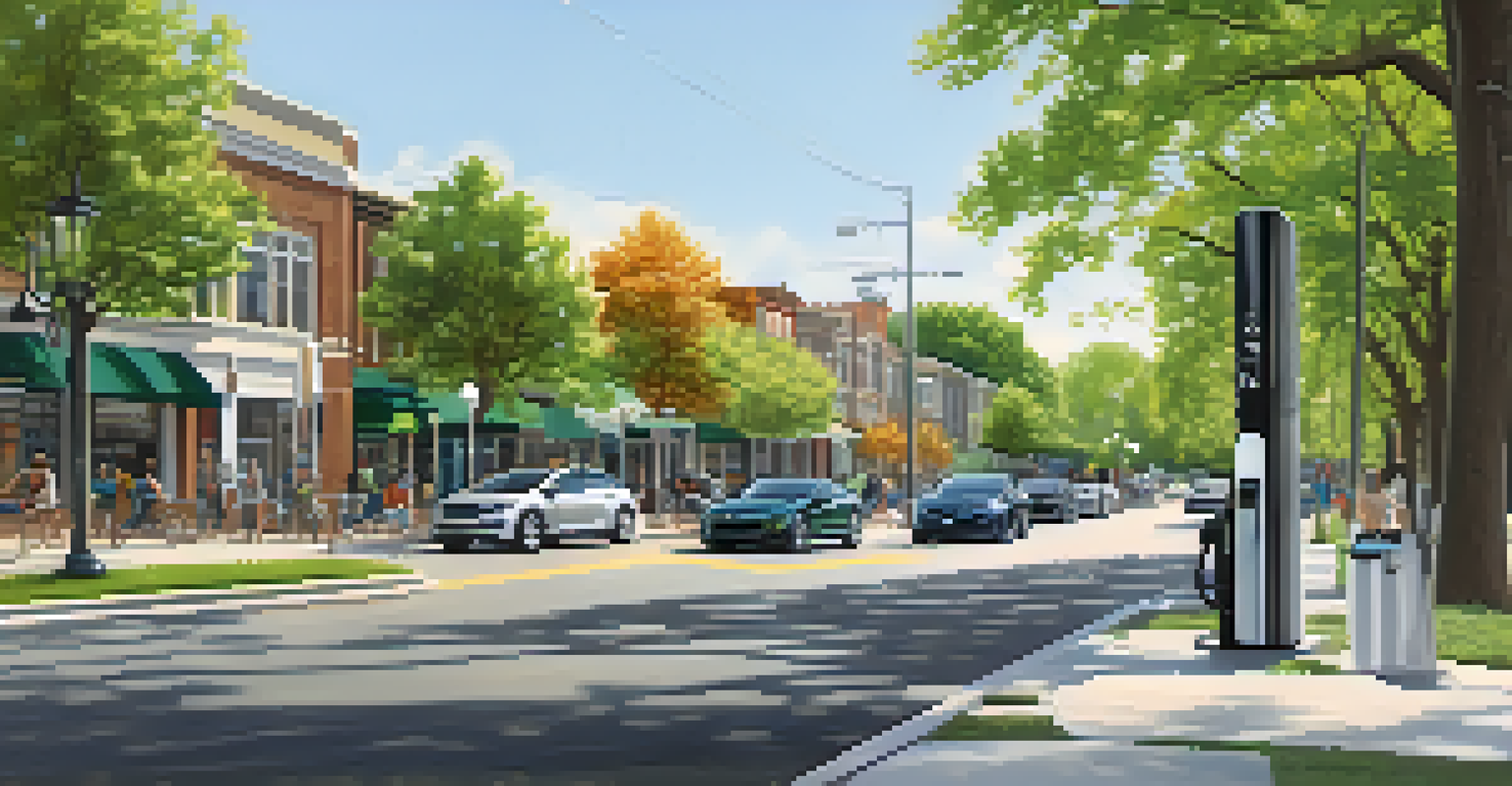Sustainable Transportation Initiatives in Illinois Cities

Understanding Sustainable Transportation and Its Importance
Sustainable transportation refers to systems and practices that minimize environmental impact while promoting accessibility. It encompasses various modes such as walking, cycling, public transit, and electric vehicles. As urban areas grow, the need for sustainable transportation becomes increasingly critical in combating pollution and traffic congestion.
Sustainable transportation is about more than just getting from point A to point B; it's about creating a healthier, more connected community.
By adopting sustainable practices, cities can enhance the quality of life for residents and create healthier environments. For instance, reducing reliance on fossil fuels not only lowers greenhouse gas emissions but also improves air quality. This shift can lead to significant long-term health benefits for communities.
Moreover, sustainable transportation initiatives can boost local economies by promoting tourism and increasing property values. Cities that invest in infrastructure for biking and walking often witness an influx of businesses catering to these eco-friendly modes of transport. As such, embracing sustainability is a win-win for the environment and local economies.
Chicago's Commitment to Eco-Friendly Transportation
Chicago, the largest city in Illinois, is making strides in sustainable transportation by implementing a comprehensive bike-sharing program. With thousands of bikes available for rent, residents and visitors can explore the city while reducing their carbon footprint. This initiative encourages active transportation and reduces traffic congestion, making streets safer for everyone.

In addition to bike-sharing, Chicago has invested heavily in expanding its public transit system. The city is focusing on electrifying its bus fleet, which will significantly reduce emissions. By providing reliable and eco-friendly public transport options, Chicago aims to decrease the number of single-occupancy vehicles on the road.
Sustainable Transport Enhances Lives
Adopting sustainable transportation practices improves air quality, reduces pollution, and boosts local economies.
Furthermore, the city has launched various pedestrian-friendly initiatives, such as expanded sidewalks and dedicated bike lanes. These improvements not only enhance safety but also promote a sense of community. By prioritizing sustainable transport, Chicago sets an example for other cities to follow.
Evanston's Innovative Approach to Sustainability
Evanston, a progressive suburb north of Chicago, is leading the way with its ambitious sustainability goals. The city has committed to reducing greenhouse gas emissions by 30% by 2025, and sustainable transportation plays a crucial role in this plan. By promoting biking and walking, Evanston aims to create a more connected and environmentally friendly community.
The future of transportation is not just about the vehicles we drive, but the choices we make in how we travel.
One of Evanston's standout initiatives is the installation of electric vehicle charging stations throughout the city. This not only encourages residents to switch to electric cars but also supports the growing demand for EV infrastructure. As more people embrace electric vehicles, the city is poised to reduce its overall carbon emissions significantly.
Evanston has also introduced car-sharing programs that provide residents with access to vehicles without the need for ownership. These programs are especially beneficial for those who may only need a car occasionally. By reducing the number of vehicles on the road, Evanston is taking meaningful steps toward a more sustainable future.
Peoria's Community-Focused Transportation Solutions
Peoria has taken a grassroots approach to sustainable transportation by engaging the community in its planning processes. Residents are encouraged to share their ideas and concerns about transportation needs, ensuring that initiatives are tailored to their preferences. This inclusive strategy fosters community ownership and leads to more effective solutions.
In alignment with community feedback, Peoria has expanded its public transit services, making it easier for residents to access jobs and services. The city has also introduced a 'Complete Streets' policy, which aims to create safer and more accessible roadways for all users, including pedestrians and cyclists. This holistic approach recognizes that transportation is vital to the community's overall well-being.
Cities Leading Eco-Friendly Initiatives
Cities like Chicago and Evanston are implementing innovative programs such as bike-sharing and EV infrastructure to promote sustainable transportation.
Additionally, Peoria has implemented educational programs to raise awareness about the benefits of sustainable transportation. By promoting biking and walking as viable alternatives, the city hopes to instill long-term behavioral changes among residents. These efforts not only contribute to sustainability but also strengthen community bonds.
Springfield's Focus on Public Transit and Accessibility
Springfield, the state capital, is working diligently to enhance its public transportation system to serve residents better. With a focus on accessibility, the city has implemented several initiatives to ensure that all community members, including those with disabilities, can utilize public transit. These improvements are essential for fostering an inclusive environment.
The city is also exploring partnerships with ride-sharing services to provide more flexible transportation options. By integrating traditional public transit with modern ride-sharing, Springfield aims to create a seamless travel experience for residents. This approach not only enhances convenience but also encourages more people to leave their cars behind.
Furthermore, Springfield is investing in infrastructure improvements, such as better bus stops and real-time tracking systems. These enhancements make public transit more reliable and user-friendly. In doing so, the city is not only promoting sustainable transportation but also improving overall quality of life for its residents.
Champaign-Urbana's Bicycle-Friendly Initiatives
Champaign-Urbana, home to the University of Illinois, has embraced a bicycle-friendly culture that promotes eco-conscious commuting. The cities have developed extensive bike lanes and trails, making cycling a safe and attractive option for residents and students alike. This commitment to cycling aligns with broader sustainability goals and encourages healthy lifestyles.
To further support this initiative, Champaign-Urbana hosts various events that promote biking, such as 'Bike to Work Day' and community rides. These events foster camaraderie among cyclists and raise awareness about the benefits of cycling. They also provide opportunities for education on bike safety and maintenance.
Technology Drives Sustainable Transit
Technological advancements, including mobile apps and data analytics, are enhancing the efficiency and user experience of sustainable transportation systems.
Additionally, the cities have implemented bike-sharing programs that allow residents and visitors to easily access bikes for short trips. This not only reduces reliance on cars but also enhances the overall experience of exploring the vibrant community. Champaign-Urbana's efforts demonstrate how cities can cultivate a culture of sustainability through cycling.
The Role of Technology in Sustainable Transportation
Technology plays a pivotal role in advancing sustainable transportation initiatives across Illinois cities. From mobile apps that provide real-time public transit updates to platforms that facilitate ride-sharing, technological innovations are making it easier for residents to choose eco-friendly options. These advancements help streamline transportation systems and enhance user experience.
Moreover, cities are harnessing data analytics to improve transportation planning. By analyzing traffic patterns and commuter behaviors, municipalities can make informed decisions about infrastructure investments and service enhancements. This data-driven approach ensures that sustainable transportation initiatives meet the needs of the community effectively.

Additionally, smart city technologies, such as connected traffic signals and electric vehicle charging stations, are being integrated into urban planning. These innovations not only improve efficiency but also contribute to reducing emissions. As Illinois cities embrace technology, they are paving the way for a more sustainable future.
The Future of Sustainable Transportation in Illinois
As Illinois cities continue to prioritize sustainability, the future of transportation looks promising. Ongoing investments in infrastructure and community engagement are essential for maintaining momentum. With a collective focus on reducing emissions and promoting accessibility, the state is poised to become a leader in sustainable transportation.
Collaboration among municipalities, state agencies, and community organizations will be vital for achieving these goals. By sharing best practices and resources, Illinois cities can implement effective strategies that benefit everyone. This collaborative spirit will help create a cohesive, sustainable transportation network across the state.
Ultimately, the success of sustainable transportation initiatives hinges on the commitment of residents and local leaders alike. By embracing eco-friendly practices, Illinois communities can foster a healthier environment and enhance the quality of life for all. The road ahead is bright, and together, we can drive meaningful change.